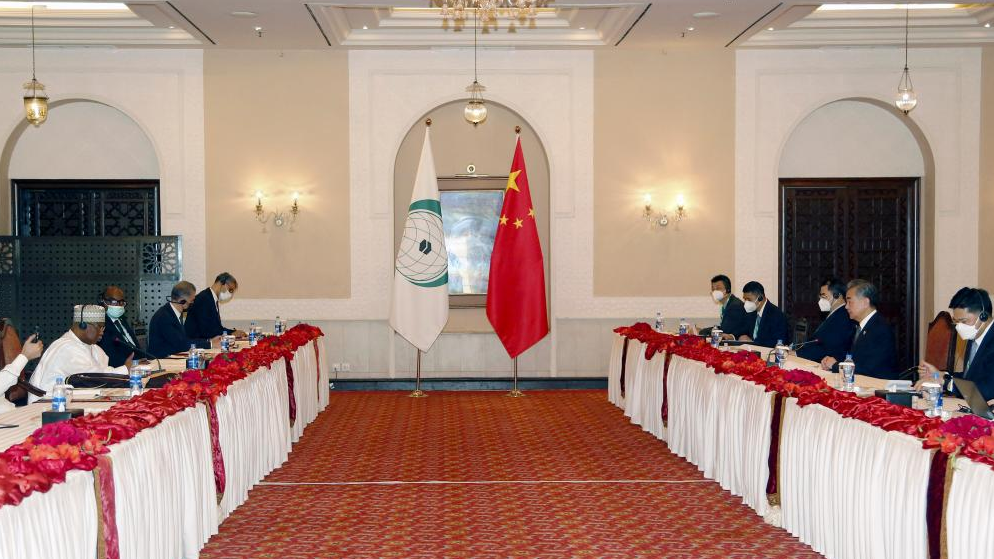
Chinese State Councilor and Foreign Minister Wang Yi (2nd R) meets with Secretary-General of the Organization of Islamic Cooperation (OIC) Hissein Brahim Taha (1st L) in Islamabad, Pakistan, March 22, 2022. [Photo/Xinhua]
By Stephen Ndegwa
The attendance of Chinese State Councilor and Foreign Minister Wang Yi at the 48th session of the Council of Foreign Ministers of the Organization of Islamic Cooperation (OIC) in Islamabad, Pakistan, on March 22 has opened a new chapter in relations between China and the Islamic world.
Wang's invitation by the OIC gives a clean bill of health for China's treatment of Muslims in the country at a time when the United States and allies have been doubling down on the country's alleged human rights abuses of the predominantly Islamic Uygur people in the Xinjiang Uygur Autonomous Region. Wang's presence in this august Islamic meeting was a reassuring gesture that China means no harm to Muslims, contrary to the perception bandied by the U.S. and its allies.
It is ironic that in matters like the vocational education and training centers in Xinjiang, the West has been crying louder than the bereaved. The U.S. knows that the success of China's Xinjiang non-violent model in fighting terrorism paints it in a very bad light.
That the OIC did not mention the Uygur controversy is proof that there is really no evidence of human rights abuses as alleged. Muslims are globally renowned for protecting themselves, and such an issue would definitely have been on the radar of the Islamic agenda. It shows a departure on matters of principle between the Muslim world and the West.
The 57-member OIC is the apex of Islamic governance in the world. With the exception of Palestine, all the other countries are also member states of the United Nations. This makes it a very powerful and influential body that can actually rival the UN in matters that need making Islamic vis-a-vis secular decisions.
The OIC respects China's non-judgmental approach to issues at both bilateral and global levels. Unlike the West, for instance, China does not intrude in the internal affairs of other countries but contributes to negotiations by invitation. This is the same temperament found in the Islamic world, thus creating mutual respect. Indeed, Wang's press conference in Islamabad dealt exclusively with areas of convergence, strength and comparative advantage between China and the OIC.
On matters Islamic, including Arab to some extent, the writing is on the wall for the U.S. and its allies. Recent reports that talks between China and Saudi Arabia are at an advanced stage for the sale of oil in Chinese yuan betrays the growing diplomatic tensions between Riyadh and Washington. The latter's "use and dump" policy is now evident and countries are evaluating whether they are at all safe with the U.S.'s double standards.
In his book The New Silk Road: How a Rising Arab World is Turning Away from the West and Rediscovering China, B. Simpfendorfer states that the Arabs and Chinese are birds of a feather. He says that both are rediscovering their close trading partnership in ancient times at a time when China is regaining its global economic dominance. The author also narrates "how China is spurring growth in the Arab world."
The strategic partnership between China and the Islamic world has added a third dimension in the current geopolitics. This partnership will definitely become powerful and help tilt the balance of power toward the side of those whose voice was hitherto muzzled or ignored. For the Muslim world, China is a genuine friend with no hegemonic interests or even tendencies.
The opening up of this trading bloc will also help create markets for developing countries that have been technically closed out of the developed economies using unfair rules. Partners of both China and the OIC will plug in this vast market and create viable and alternative value chains.
For China, the weight of global leadership is increasing. More partnerships will coalesce around such initiatives and snowball into mighty partnerships of like-minded countries, regions and interests.
The author is a Nairobi-based communication expert, a lecturer-scholar at the United States International University-Africa, and an author and international affairs columnist.

 中文
中文



